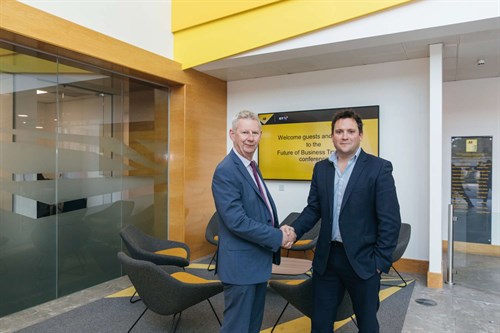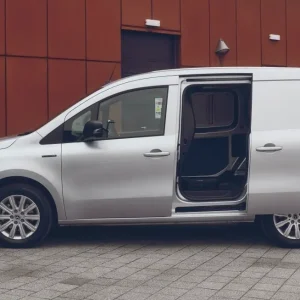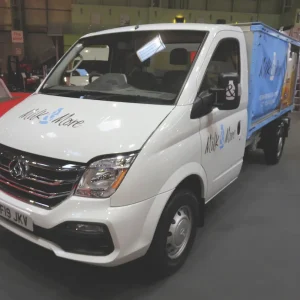Greater collaboration between fleet operators and the government is needed to bring about an effective uptake of cleaner-fuelled vehicles, according to joint research by the AA and BT Fleet Solutions.
In their 2018/19 report: Operational Fleet Insight: Clean Air and Alternative Fuels, the AA and BT found that 85% of the 500-plus fleet managers surveyed believe tackling air pollution should be a combined effort between motoring and non-motoring organisations.
With four out of five vans on the UK’s roads not yet compliant with London’s Ultra Low Emission Zone (ULEZ), which came into force on 8 April, Henry Brace, managing director of BT Fleet Solutions, said it is frustrating for small businesses in particular that there is no unified strategy between the six more cities planning to bring in Clean Air Zones (CAZ).
Speaking at a round table event to launch the report, Brace said: “Commercial vehicle operators feel they’re getting hammered.”
But while Brace noted the “early pace setters [in introducing alternative-fuelled vehicles] got burned”, he suggested the market is now moving towards establishing a critical mass, but cautioned: “The product is not quite there in CVs.”
He said start-ups, as well as major vehicle manufacturers, have a role to play in bringing green vans to market and name checked Arrival’s 3.5-tonne T4 electric van, which the Royal Mail has trialled.
Although most publicity is heaped onto electric technology, Brace believes that going forward, a broad range of alternative fuels will be required to replace the internal combustion engine.
He pointed to the AA and BT Fleet’s research, which found 72% of fleet managers believe diesel has gained an unfair reputation for producing harmful emissions, with advances in the development of cleaner diesel engines not acknowledged.
The survey found an expected reduction in the use of diesel of just 16% during the next five years.
In failing to establish a joined up strategy for the adoption of AFVs, CAZ and the replacement of diesel and petrol, Brace accused the Department for Transport (DfT) of “a massive abdication of duty”.
As an example, he claimed a consequence of Southampton introducing strict emissions regulations is that fleets will transfer their operations to nearby Portsmouth, thereby moving the problem rather than solving it.

The AA’s Edmund King (left) with BT Fleet’s Henry Brace
(Continued from previous page) Edmund King, AA president, pointed out London councils have also acted unilaterally, with Hackney and Camden each introducing zero emission streets within their boroughs in moves not related to Transport for London’s ULEZ.
The dilemma for van operators, according to Brace, is that while people will always say they want cleaner air the explosion in dotcom deliveries is driving more vans into cities.
Customers, however, do not want to pay more for their deliveries to cover the extra costs to operators entailed by switching to greener vans or paying congestion charges. Brace predicted a backlash will come when these costs are passed on to consumers.
So the challenge is to meet demand while lowering the carbon footprint and to this end BT Fleet has pledged 85% of its fleet will be ultra-low emission by 2030.
Beth Dawson, major projects manager at Fuel Cell Systems, argued that despite advances in diesel engine technology, it is “proven that poor air quality is always bad”, (according to the World Health Organisation) and that getting rid of diesel “is worth it”.
Dawson made the case for developing hydrogen-powered vehicles and renewable energy alongside battery electric vehicles by pointing out that charging too many plug-in vehicles at the same time in a residential area would be likely to cause a power failure.
Gary Harrison, head of engineering at BT Fleet Solutions, believes changes in legislation will ultimately drive change in fuel use, as was the case in the 1980s when diesel became dominant.
Harrison concured that the DfT passed on responsibility for establishing CAZ to local authorities, many of whom viewed it as a money–making opportunity. Stuart Thomas, director of Fleet and SME for the AA, said the question van operators must answer is how fewer vehicles can deliver more goods. Hubs outside cities where electric vans collect deliveries could help but, as Harrison said: “It’s not just a final mile parcel delivery problem.”
What happens when the van is permanently equipped as an engineer’s place of work and needs to travel long distances?
“A broadband fix can’t be final mile,” he said, “the van is a workshop.”
Manufacturers such as Ford, with its PHEV Transit Custom, believe hybrids could provide a solution. The AA’s King said operators working in central London must work out whether it is more cost effective to buy new Euro6 or alternative fuel vans or to pay the £12.50 daily ULEZ charge. King and Brace agreed that the expanded ULEZ, due to come into force in 2021, will be the game changer for LCV fleets as it is set to be 18 times the size of the current zone, which follows the boundaries of the London Congestion Charge area.
“Small businesses running a van will be hit hard,” said Brace, “you can’t charge customers £12.50 more [per job].” As for large national fleets, he says they will move their non- ULEZ or CAZ compliant vans to rural areas where the emission conditions do not apply.





